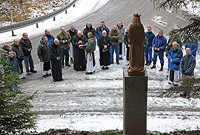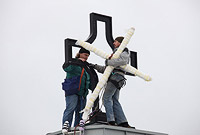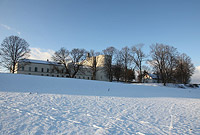Abbey
A Time of Grace and Celebration
Solemnity of the Immaculate Conception – December 8, 2012
Nový Dvůr becomes an abbey. Election and installation of the new abbot
In early December, everything was ready – or nearly so – to receive the Father Abbot of Sept-Fons, the Father Master (notary of the election), and the witnesses. On December 7, 2011, Brother Theophane would have turned fifty.1 The next day, on the feast of the Immaculate Conception, exactly 83 years after Father Jerome entered the monastery,2 the first snow and the early hour discouraged even the most faithful of guests. Only the monks were witnesses to the solemn act that made Nový Dvůr, founded nine years and a few months earlier, an abbey. Our friends remained present in our prayer and we in theirs. The professed signed, on the altar, the act written in Latin. Dom Patrick, Abbot of Sept-Fons, gave the homily:
(…) It was only fifteen years ago that there were ruins here of a beautiful farm in the Baroque style of architecture (…) Today, there is a community of Cistercian monks who, with courage and perseverance, live out the best they can their vocation of praise and intercession. What has been done is enormous, and all that remains to be done, may we never forget, has no other purpose than this: to let men whom God has called live a life of intimacy with Our Lord here, in prayer, thanks to our community, to work, to silence, and to separation from the world. (…) To tirelessly perform and never retreat from the tasks of daily life, beginning with the work of God; by using the monotonous and repetitive aspects of daily life to deepen them and to discover their hidden richness – this is how we last; by banking on true values: simplicity, openness, courage, patience – that’s what’s really solid. By acting like this, one can weather many storms, and when the unexpected knocks on the door, it does not surprise us, but rather finds us capable of facing all kinds of situations – and we come out of them stronger and wiser.
(…)
Up to this point in time, God has blessed your monastery with all kinds of blessings; at the same time, he has not spared you the trials that make people grow, who know how to recognize his hand. We have faith that He will continue, through joys and pains, His blessings to the new abbey, provided that the monks who have chosen to live there do so honestly, with confidence, and without looking back.
Election and installation of the first abbot of Nový Dvůr
Then we proceeded with the election, and the result was no surprise to anyone. He who had been the superior of the foundation before becoming prior was chosen by his brothers – in spite of his character (our bishop reminded him of this aspect of his temperament in the homily of his abbatial benediction). Nobody at Nový Dvůr has any illusions about the perfection of the man who governs, nor of that of his brothers. The new abbot was installed in his duties and the brothers promised him obedience. Fr. Augustin was named prior. As for Fr. Romaric, he retained his responsibility as sub-prior; it was the same for the cellarer, the guestmaster, and the under-master. When there is no reason to change, said the Blessed Mary of the Incarnation, missionary to Canada, that in itself is a reason not to change. Here is what Dom Samuel said:
Even if some people around us thought it was just a formality, I never saw this election as being one. For nine years now, I have had the time to become aware, as you have, that there are aspects of my personality that are not in agreement with what the Rule expects from an abbot. (…) As deep as our defects may be – yours as well as mine – this community was born, has grown, and has solidified. The ruins have disappeared and the Abbey of Our Lady of Nový Dvůr has come into being. Soon we are going to sing the Te Deum. May this be, for you as for me, the time to thank God, He who is able to make His way through men who are always poor and fragile.
The vocation of the founders is to disappear one day and to leave room for others who, we hope, will live the same values and know how to convey them. Even if God has sent us brothers with merit, we must give them time to become well formed. (…)
The meal was festive. We had a cake with the coat of arms of Nový Dvůr with a crozier made of almond paste. We were filled with tranquil joy.
A time of rejoicing: the blessing of a statue of the Virgin at the edge of our forest
After the office of None, we went down the hill through the forest to bless a statue of the Virgin installed on the edge of the forest, along the road that leads to the monastery. It shows those passing by that this is a place of prayer. On the baroque pillar, found in the ruins of Nový Dvůr, is engraved forevermore: Opatství Matky Boží v Novém Dvoře (Abbey Our Lady of Nový Dvůr) MMXI. During Vespers, Dom Samuel will consecrate the new abbey, its novitiate, and its ministry to the Immaculate Heart of the Blessed Virgin Mary. Everyone present, including novices and postulants, signed, on the altar, the certificate testifying to this event. The illuminated parchment will two days later be placed in a bronze tube and set in a gilded cross on the bell tower of the abbatial church. Wherever they work, the brothers will be able, by looking at that cross, to invoke Her whom they have asked for protection. Friday and Saturday are ordinary days: the Divine Office, personal prayer, reading, and work take up our time.
Third Sunday of Advent, December 11, 2011
Final preparations: the blessing of the statue of Saint Benoît-Joseph Labre
Sunday. In the church, we have placed the image of Our Lady of Skoky – in the past revered in a neighboring church, which is today sadly in ruins – and a bronze copy of which we have offered to Sept-Fons, in thanks. Before the Mass, in front of the guesthouse, a bronze statue of Saint Benoît-Joseph Labre, pilgrim beggar, a novice at Sept-Fons in the 18th century who died in Rome, was blessed by Dom Patrick. The same statue is at Sept-Fons. Another meaningful gesture: two small reliquaries made by Goudji, a Paris silversmith, were placed – one in the chapter at Nový Dvůr, and the other in the sacristy at Sept-Fons. They contain the relics of three young holy and blessed 20th century Cistercians (Rafaël, Maria-Gabriella, and Mary-Joseph), to encourage our brothers to follow in their footsteps. On that day, the Father Master of Sept-Fons preached:
…You have just elected an abbot and you are going to have a solemn celebration, “with great pomp.” You are right to do so; but so that this is not a commonplace, routine rite, it is important that tomorrow’s celebration has a solid base.
What will happen later, here or at Sept-Fons, in thirty years, to a given brother, or to a given generation? Will they be servants of the monastic life or among those who hate it? The world and the monastic life, which are for all ages and even more so for our own, are crossed by flattering currents that find complicity in our hearts. John the Baptist, like so many others, could have made himself out to be the Messiah. He would have been a false messiah. He consented to be just the herald, the Precursor – he who walks before – the friend of the bridegroom, which is summed up by the lovely Greek word, corypheum. But in this case, his destiny was lost, as our own is meant to be lost, in self-effacement, in the accomplishment of an austere task, in the shadows. We have passed on to you a monastic life. We have given you, and we continue to give you, a formation that is at once human, intellectual and spiritual – in a word, a precious heritage and one of great value, drawing from pure springs, from which we ourselves have drawn.
Feast of Our Lady of Guadalupe, December 12, 2011
A time of grace: the abbatial blessing
Friends, priests and religious arrive in droves, and right on time. The prostration of the elected abbot, during the litany of the saints, the transmission of the Rule, the ring and the crozier – the pastoral staff – are all clearly symbolic. The wearing of the miter by an abbot is less clear to some. In fact, it is a helmet. Clearly, one can go into battle without a complete set of equipment, but in that case one shouldn’t complain if one ends up taking a hit. It’s better to be protected. A helmet is not superfluous in these situations. On some days, a young abbot would dream of having a miter in his desk drawer!
« Domine fortitudo mea »
« Lord, my strength; Pane, má sílo » I have been toying for a very long time with the idea of turning this verse of a psalm, which we will read tomorrow at the night office, into a potential motto. I believe and I have had the experience that it is God Himself who acts through us when we dare, with humility and sincerity, to take our place as an abbot or a disciple, as a disciple and abbot at the school of the Service of the Lord. As abbot, I do not intend to cease being a disciple. Whoever knows me knows the strength I have drawn for thirty years from two exceptional friendships, without which I would be nothing – that of the Father Master and of the Reverend Father Abbot of Sept-Fons, to whom the brothers of Nový Dvůr owe a great deal as well. As abbot, I will try to be a father and a friend, my brothers, to each one of you. Never forget what our Father Saint Bernard wrote: Whoever makes himself his own master makes himself the disciple of a fool. Lord, my strength. It is first of all a call: Lord! The noblest act which can spring forth from the heart of a man is prayer. The prayer of a Christian and, more dramatically, that of a monk, tears him from an existence without perspective and without a goal and gives meaning, a wide horizon, an irresistible weight to his existence to the extent that he binds himself in friendship to the Lord. May the name of Jesus and of his Mother, my brothers, always be on your lips. (…)
That a handful of sincere men, no better than others, try to put God first in their existence, we believe that they lift up the Church and all humanity. (…) May we give thanks to God for the work that they have achieved here and may the Blessed Virgin Mary, Our Lady of Nový Dvůr, protect our future and support us.
Monday evening or Tuesday morning, our invited guests were back on the road, and the community of Nový Dvůr was back to the rhythm of ordinary days.
Sept-Fons, 4th Sunday of Advent
At the end of the week, Dom Samuel, accompanied by a few monks of his community, came back to his house of origin to see his brothers. He went to see his elderly parents, who had not been able to come to Nový Dvůr. At Sunday Mass, at Sept-Fons:
(…) One of the grand aspects of the abbatial ministry and of the Father Master – for they are nearly the same ministry – consists in living on two levels: first of all to confront for oneself those interior enemies from which God delivers us, like David (cf. 2Samuel 7), without, however, sparing us the combat – that cross, around one’s neck, obligates me and protects me more than it distinguishes me; then to guide me and support the brothers who are called to fight the same fight – that same cross is a sign for them ; it indicates the direction of their existence. There really must be something we can give to the Lord, otherwise, what friendship can we claim? (…) Do not be afraid when sin besieges your heart; God is faithful, He will not let you be tempted beyond your capacities. Do not be afraid if the world all around seems to scorn happiness, to turn its back on the Lord: the men who inhabit the world are the same as us, and the frontier between good and evil crosses as well through the interior of our own hearts; the grace of God will come out the strongest.
The Father Abbot of Sept-Fons concludes the ceremony:
(…)You are now beginning a new phase in the history of your monastery. The mother abbey sees this with joy and also with a little nostalgia, for we have covered together, we and you, a long road, together carried a great number of concerns, of true joys and also some great tribulations. Of course, every monastery has its path and its destiny, but I firmly believe that our own remain profoundly linked, over there as well as here, for we seek God in the same manner, already tested by time and experience, and we know full well that, to do this, we absolutely need each other’s support. And so you can count on our support, the concrete sign of our common desire to live our vocation of Cistercian monks, in Bohemia as in the Bourbonnais, with the grace of God.









